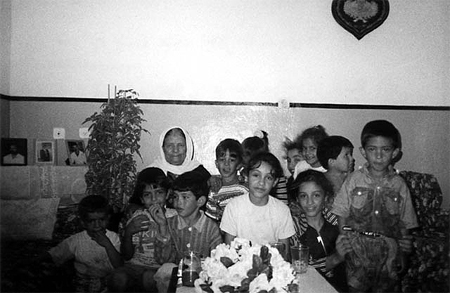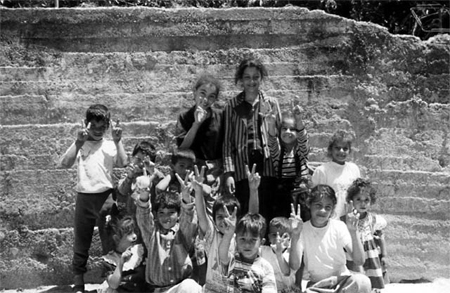
|
 |
| Hajji Fatima Da'jen with some of her grandchildren. Beit Jibrin Camp, Bethlehem, June 1998. |
| Hajji Fatima Da'jen, Beit Jibrin, June 5:
|
|
Most of the contacts I make in the West Bank are through friends who work with BADIL, a small Bethlehem-based NGO that has built a network of contacts in all the camps. Through BADIL I meet 'Afif Ghatasha, UNRWA director of Aida camp, and coordinator of the camp's Youth Activity Centre. Aida is the smallest of the camps around Beit Laham, and because it's so small the speakers 'Afif would have liked to take me to are not here today: one couple is spending the day in Jerusalem, another is visiting relatives in Jordan - an interesting sign of the determination of refugees not to let check-point and border obstacles imprison them entirely. So 'Afif drove me to another Bethlehem camp, Beit Jibrin , and introduces me to Hajji Fatima Da'jen. In my travel note-book I wrote "she is a very sweet faced woman with a clear, soft voice, dressed in a thawb". I guessed that her dialect hasn't changed at all from 'ayyam Filasteen'. In the same way old ladies from Majdel Kroom in Shatila camp (Lebanon) still dress and speak much as they did before the expulsions, using words specific to rural Palestine that younger Palestinians have dropped.
Beit Jibrin camp is called this way because all its inhabitants are from Beit Jibrin, a rare case, and quite the opposite of Dheisheh camp which contains people from the largest number of different villages. Camps with one predominant origin are quite different in cultural and political atmosphere from more mixed camps, as I knew from Lebanon. In single-origin camps pre-1948 authority structures continued unchallenged into exile, binding individual households to an informal leadership of clan heads and mukhtars. In more mixed camps, there was more opportunity for new, less conservative leaderships to arise. Culturally, single origin camps were able to preserve specific village cultures -- dress, manner of speaking, favourite foods, songs, dances and other art forms - much better than mixed camps which quickly became 'melting pots' from which emerged a new hybrid 'Palestinian' |
culture and identity, and new versions of nationalism. It isn't just her age that makes Hajji Fatima recall Beit Jibrin village with such pride, it's also that living surrounded by co-villagers reinforces 'village patriotism'. She tells me that Beit Jibrin was famous for its Roman ruins and its olive groves. She makes a mistake over the date of the Balfour Declaration, reflecting the fact that girls of her generation in villages didn't go to school; but she is precise about the different stages of her family's trajectory after expulsion. This has value in showing that not all villagers went directly to refugee camps, but tried to make a living from their labour, and to rent housing. Hajji Fatima's five sons and five daughters are all educated.
Hajji Fatima speaks: We left and went to Hebron. We stayed in Hebron for four months. Then we went to Beit Omar. We stayed in Beit Omar for nine months. We stayed in 'Arroub around a year and a half. In 'Arroub we were in tents. Then we left again for Hbeyla. This Hbeyla belonged to the Jews, a Jewish company, and the Arabs took it. We rented it from them even though it was enemy property. We stayed in it, we took land, we took homes and things, and we stayed. We built [homes] and we planted grapes and figs and apples and plums and everything. Then came the war of 1967 and the Jews came and kicked us out. They took what we had planted and threw us out. We came here. This is our life, all of it. We depend on God..." |
 |
| Grandchildren of Hajji Fatima Da'jen. Beit Jibrin Camp Bethlehem, June 1998. |
[Hassan Abdel Jawad] [Umm 'Afif Ghatasha] Copyright©2005 |
|